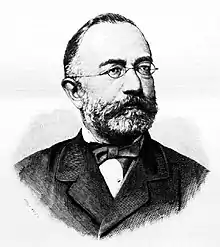Josef Budenz | |
|---|---|
 German-born linguist of Hungarian | |
| Born | June 13, 1836 Rasdorf, Germany |
| Died | April 15, 1892 (aged 55) |
| Nationality | German |
| Occupation | linguist |
| Known for | origins of Hungarian |
Josef Budenz (Hungarian: József Budenz) (13 June 1836 – 15 April 1892) was a German comparative linguist specializing in Finno-Ugric who researched the origins of the Hungarian language.
Early life and education
József Budenz graduated from high school in Fulda in 1854[1] and studied in Marburg and from 1855 for three years in Göttingen, among others with Theodor Benfey[1] with a focus on Indo-European comparative linguistics. He received his doctorate in 1858.
Career
In 1858 he was in Budapest and taught in Székesfehérvár. In 1861 he was appointed librarian of the Hungarian Academy of Sciences. He deepened his knowledge of Uralic and Altaic languages under the guidance of Pál Hunfalvy. From 1868[lower-alpha 1] he was a full professor of Altaic comparative linguistics, the chair having been established especially for him. In 1871 he became a full member of the Hungarian Academy of Sciences. On 17 March 1884, he was honored in the university auditorium. From 1876 he was a corresponding member of the Russian Academy of Sciences in St. Petersburg.
Origins of Hungarian
Today, the consensus among linguists is that Hungarian is a member of the Uralic family of languages.
The classification of Hungarian as a Uralic/Finno-Ugric rather than a Turkic language was a matter of impassioned political controversy throughout the 18th and into the 19th centuries. During the latter half of the 19th century, a competing hypothesis proposed a Turkic affinity of Hungarian, or, alternatively, that both the Uralic and the Turkic families formed part of a superfamily of Ural–Altaic languages.[2][3]
The debate came to a head in the 1880s between the two camps,[4] known as the Ugric-Turkic war.[2] One camp proposed that Hungarians were related to Turanians, supported by Arminius Vambery who wrote a book on the topic and was a friend of Budenz. Budenz attacked Vambery's book in a lecture at the Hungarian Academy, and challenged his methods as unscientific. Vambery struck back with his own accusations against his friend.[4] After things settled, the Finno-Ugric hypothesis was concluded the sounder of the two, mainly based on work by Budenz.[2]
Death
Budenz died in Budapest on 15 April 1892, and was buried on 17 April 1892.
Memorials and retrospectives
On 27 May 1963, a memorial plaque was dedicated in his honor at the house where he was born, currently in use as the town hall of the village where he formerly attended school in Rasdorf.[5] The commemorative plaque bears the inscription: "Here stood until 1954 the house in which on 13 June 1836 Joseph Budenz was born. He was a professor at the University of Budapest from 1868 until his death on 15 April 1892, and is the founder of modern Finno-Ugric comparative linguistics. Donated by the Societas Uralo-Altaica on May 23, 1963."
The Fuldaer Geschichtsblätter also published an article about him in 1936 on the centenary of his birth.[6]
The Budenz Gymnasium in Budapest published a Budenz memorial book in Hungarian in 2002. A "Budenz Day" is held every year at the Finno-Ugrian Seminar of the University of Göttingen.
Works
- Budenz, József (1869). Ugrische Sprachstudien (in German). Vol. I–II. Pest: L. Aigner. OCLC 492188431.
- Übersicht der Verzweigung der ugrischen Sprachen, 1878
- Budenz, József (1966). A comparative dictionary of the Finno-Ugric elements in the Hungarian vocabulary. Uralic and Altaic series, v. 78. Bloomington: Indiana University. OCLC 15269354.
See also
- Comb Ceramic culture
- Estonian language
- Finnic languages
- Finnish language
- Finno-Permic languages
- Indo-Uralic languages
- Old Hungarian script
- Proto-Finnic language
- Proto-Uralic homeland hypotheses
- Proto-Uralic language
- Samoyedic languages
- Turanism
- Ural-Altaic languages
- Uralic languages
- Uralo-Siberian languages
- Volga Finns
References
- Notes
- ↑ According to another source, he was full professor from 1872
- Citations
- 1 2 Budenz-album: Budenz József XXV éves nyelvészeti müködése emlékére kiadják tanítványai (in Hungarian). Knoll Károly. 1884. p. 1.
- 1 2 3 Marcantonio, Angela; Nummenaho, Pirjo; Salvagni, Michela (2001). "The "Ugric-Turkic Battle": A Critical Review" (PDF). Linguistica Uralica. Rome. 2. Retrieved 1 July 2021.
- ↑ Klaniczay, Gábor; Werner, Michael; Gécser, Otto (September 2011). Multiple Antiquities - Multiple Modernities: Ancient Histories in Nineteenth Century European Cultures. Frankfurt: Campus Verlag. pp. 209–. ISBN 978-3-593-39101-4. OCLC 871761031.
- 1 2 Mandler, David (21 July 2016). Arminius Vambéry and the British Empire: Between East and West. Lanham, Maryland: Lexington Books. p. 24. ISBN 978-1-4985-3825-1. OCLC 959555062.
- ↑ "Ausgabe 1 der Rasdorfer Geschichtsblätter auf rasdorf.de" [Issue 1 of the Rasdorf Historical Newsletter at rasdorf.de] (PDF) (pdf). p. 3. Archived from the original (PDF) on 2016-03-04.
- ↑ Hack, Johannes (1936). Rübsamen, Dieter (ed.). "Der Sprachforscher Josef Budenz aus Rasdorf, Professor in Budapest". Fuldaer Geschichtsblätter. Fulda: Fuldaer Geschichtsverein. 28: 65–74. as cited in Jenks, Stuart (ed.). "FuldaGbll 1, 1902-35, 1959 – Magazine Stacks". New York: Fordham University.
Further reading
- von Farkas, Julius (1955). "Josef Budenz". Neue Deutsche Biographie (in German). Munich: HiKo. OCLC 923301198.
- Décsy, Gyula (1980). Beiträge zur Geschichte einer 1200-jährigen Gemeinde, Historische Festgabe zur 1200-Jahr-Feier [Rasdorf, Contributions to the history of a 1200-year-old municipality, historical commemorative publication on the occasion of the 1200th anniversary.] (in German). Rasdorf: Gemeindevorstand der Gemeinde Rasdorf. p. 126ff. OCLC 74609704.
- Sturm, Erwin (1971). Rasdorf, Geschichte und Kunst [Rasdorf, history and art] (in German). Fulda: Parzeller. p. 31ff. OCLC 977734689.
External links
- Jozsef Budenz in the Hungarian Biography Lexicon (in Hungarian)